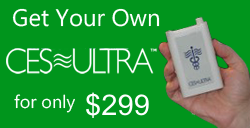CES vs. tDCS
It is perhaps time to set the record straight about transcranial direct current stimulation (commonly known as “tDCS“) and the sudden rush to embrace this new technology.
There is a serious misunderstanding which should be done away with at the outset. tDCS is not ECT (electroconvulsive therapy). We are talking instead about a totally different modality. Further, within that modality, yet another distinction should be made. There is tDCS (transcranial direct current stimulation) and CES (cranial electrical stimulation) which is based not on DC (direct current) but on AC (alternating current).
About tDCS
Much of the current (no pun intended) hoo-hah is about tDCS and specifically the device being marketed by foc.us. It is based on research of a dubious nature and promoted as a new Hula-Hoop® toy for the mind for gamers and those hoping for a quick cognitive fix.
Though it affects the human condition, the U.S. Food and Drug Administration (FDA) has not intervened to regulate the device, primarily because its sponsors make no medical claims. It has also not been adequately tested for safety, though the amperage, being as low as it is, is in all probability harmless. Due to the absence of studies, very little is known about the long term effects of tDCS on developing brains.
About CES
CES (cranial electrotherapy stimulation) is also a hand-held electronic device that is simple to use and has no side effects. Unlike tDCS, however, CES has been around for more than half a century, has a substantial body of solid scientific research behind it, as well as an unblemished safety track record. CES manufacturers are registered and monitored by the FDA and are allowed to make claims for their device for the treatment of anxiety and insomnia. Though no claims are made about enhanced cognitive functioning, results demonstrate gains in that realm, as well.
Common sense says that cognition is very much a function of those states. If you are less anxious and getting a good night’s sleep, your cognitive functioning improves as well. Conversely, the more stressed out you are, the less able you are to think clearly. It is somewhat depressing as one who has worked in the field for more than 35 years to encounter a discussion on the brain and electrical activity and hear not a word about CES. Incidentally, at a time when our veterans are struggling to find a non-drug solution to Post-Traumatic Stress Disorder (PTSD), CES is currently used exactly for that purpose, being prescribed for active duty personnel at these military bases, hospitals and theaters of operation:
- Fort Hood, Texas
- Fort Campbell, Kentucky
- Joint Base Lewis-McChord, Washington
- Naval Hospital, Bremerton, Washington
- Combat operations in Iraq and Afghanistan.
Summary: Differences Between tDCS and CES (CES vs. tDCS)
What are the differences between tDCS and CES? tDCS uses direct current and is an unregulated consumer device; it has no allowable medical claims. CES uses alternating current and is an FDA regulated, FDA registered medical device; it is safe for the treatment of insomnia or anxiety.
When it comes to employing gentle electrical stimulation for the treatment of anxiety and insomnia, as well as an associated upswing in cognitive functioning, using a government regulated modality, CES is clearly the only viable option.
 Rated 4.8/5 based on user reviews
Rated 4.8/5 based on user reviews
I purchased my CES Ultra for use in my clinic and for my personal use after reading about the Veteran’s Administration testing Cranial Electrical Stimulation for Post Traumatic Stress Disorder in veterans. Since I am an Active Duty Army Physician Assistant serving with the 10th Mountain Division and later the 25th Combat Aviation Brigade on 3 deployments to Iraq, I treat many young Soldiers with both of those conditions. Using both professional psycho-therapy (standard talk therapy), SSRIs and CES Ultra I felt that we were giving our Soldiers the best possible therapies. Where no one therapy works for all conditions and all Soldiers, I felt that the more tools in my arsenal the better. All the Soldiers seem to like the immediate calming effects of the CES Ultra and many of the Soldiers commented that they slept much better on nights they got a session with the CES Ultra. I use it when doing office work and filling out patient’s charts and always feel more calm and focused and sleep better when I use it regularly. I recommend CES Ultra to anyone who feels anxious or frazzle and wants a non-medication treatment for calming ones nerves and improving their sleep.
MAJ James M Brumley, APA-C
Citations
- Johns Hopkins Medicine – Transcranial Direct Current Stimulation (tDCS)
- CES Ultra – What is CES?
- U.S. Food and Drug Administration – Sec. 882.5800 Cranial electrotherapy stimulator.
